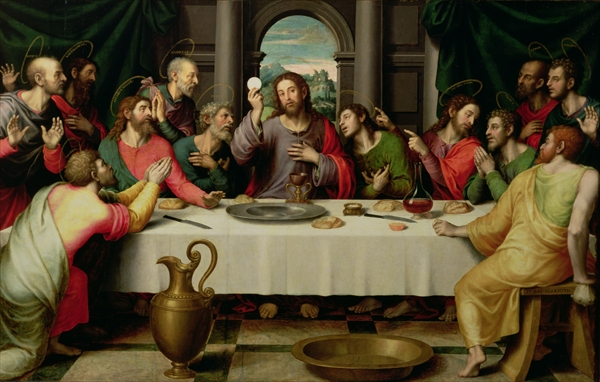
by Bret Capranica | May 12, 2011 | Ecclesiology, Featured Articles, Pastoral Ministry, Preaching
This week”™s sermon will look at 1 Corinthians 11:17-34 and how the Lord”™s Supper should be a clear, visible indication of who the church is. Think through the following as you prepare for Sunday: Carefully Think Read 1 Corinthians 11:17-34. List as much as you can about the right ways we should approach the Lord”™s Supper. From what you read here, what were the Corinthians doing that prompted this instruction from Paul? In 11:28, we are called to examine ourselves so as not to participate in the supper in an unworthy way. How was the Corinthians”™ participation unworthy? What does that suggest about how we could participate this Sunday in an unworthy way? From what we learn about the Corinthian abuse of the Lord”™s Table, what does it suggest about how they improperly viewed the church? Read 1 Corinthians 10:16-17. What is the “body” referred to here? How does this impact how we should view the church during the Lord”™s Table? Prayerfully Meditate How do you normally prepare yourself to take the Lord”™s Table? How could what you see in 1 Corinthians 11:17-34 help you? In what ways do you think about those in our church with whom you will take the elements of the table? How could 1 Corinthians 11:17-34 help you? In addition to personal reflection and confession of sin as a means of preparation, reflect on the benefits of the body of Christ and the relationships you share in the church. If your relationships with those in the body are weak, why? What can you do to strengthen them? If your participation in the lives of...

by Bret Capranica | May 10, 2011 | Featured Articles, Ordinary Pastor, Pastoral Ministry
Over a year ago, I wrote The previous article discussed essentials for a pastor”™s study. In this one I want to think through the benefits and drawbacks of having a study primarily at the church or at home. For some this is not an issue. Either the church does not provide a place for a study (especially for church planters), or someone does not have the space at home for a study. I have served four churches in my almost 23 years of pastoral ministry. In two of the churches I kept the totality of my study at the office the church provided me. I did not have any place in the homes I lived in for a separate study. In the last two churches, I have maintained both a home and a church-based office and study. Even with very young children (and at times, a lot of them), I”™ve found it most helpful for me to do the bulk of my serious Bible study, thinking work, and sermon preparation at home. For meetings, planning, administrative work, etc., I love using my church office. Here”™s a look at the benefits and drawbacks of keeping the bulk of my study at home. Benefits Concentration. Years ago, I heard John Piper in a Q & A session indicate that he kept his study at the church for a few months, but found out that it didn”™t work for him to concentrate and so he moved it to his home. I have found it easier to have uninterrupted concentration at home as opposed to the church office. At my office, I want...

by Bret Capranica | May 6, 2011 | Featured Articles, Ordinary Pastor, Pastoral Ministry, Time/Life Management
The previous post looked at the background, reasons, and benefits of having a weekly planning or review in order to focus on priorities in life. In this final post, I want to look at when you should do the review, what I do, and some things to watch out for. When Some of the principles that should govern when you do your weekly review are: “¢ Toward the end of your work week so you can look back on what was effective, how the next week will be affected by the previous week, what needs to be adjusted, and what needs to be followed up. “¢ Close to the beginning of your new work week. More than likely, your brain needs a break from the activity of the week. But before you begin a new one, your mind needs to gain an overall perspective of what”™s ahead. Pick an in-between time ““ where you”™ve had the opportunity to get away from the previous week and when you can mentally set the agenda for the next. For me this is Saturday morning. Friday is my day off and I typically block the day for family activities and rest. I don”™t want to think and plan on that day ““ I want to decompress and enjoy my family. So planning on Friday would simply be exhausting and frustrating. Sunday is filled with ministry opportunities. The morning is focused on preparing to preach and teach, the afternoon generally consists of lunch with church members and preparation for our evening gathering. I also often meet with a group of men to discuss Sunday”™s...

by Bret Capranica | May 5, 2011 | Ecclesiology, Featured Articles, Pastoral Ministry, Preaching
Our sermon this Sunday will be on the subject of baptism as a defining marker of what makes a church. As you prepare for Sunday consider the following: Carefully Think Read through Romans 6:1-11. What is the main theme of this section? How do you know? Read through Romans 6:3-5. What do these verses emphasize in relation to the main idea of 6:1-11? Why does Paul use the word “baptize” in relation to our salvation? Does he have in mind water baptism? Spirit baptism? Some combination? How can you tell? In your understanding, what is the purpose for water baptism? Read through Mark 16:16; 1 Peter 3:21; Acts 22:16; Acts 2:37-41. What relationship does baptism have to conversion? Prayerfully Meditate Have you been baptized? If so, When? Where? Why? If not, why not? Who should be baptized according to the verses you have read above? Conversely, from what you learn from the verses above, who should not be baptized and why? How important is baptism to the Christian life? Remember what you have read in relation to baptism and how it fits with Romans 6:1-11. Consider what Matthew 28:18-20 suggests. Actively Respond If you are a Christian and show the evidence of internal regeneration, but you have not been baptized, why not? Is this a biblical reason? Why would you delay openly professing your faith. Schedule a time to talk with one of the elders about this. What about children who profess faith? According to Romans 6:3-5 what is true about a person”™s soul and what is baptism depicting. Do you see specific evidence of such a radical regeneration...

by Bret Capranica | May 3, 2011 | Featured Articles, Ordinary Pastor, Pastoral Ministry, Time/Life Management
One of the most helpful tools in my time management arsenal has been the weekly review or weekly planning. That is, taking a set amount of time with a prescribed list of actions that help me think through what needs to be done according to priority during the next week. Today and Friday, I will describe this process ““ from its background to its purpose, benefits, timing, problems, and details. Background I was first exposed to the idea of a structured time weekly planning after attending a Franklin Covey workshop on time management. As I look back and prior to what I do now, I did try to plan out my week each week. Out of necessity and from too many weeks of being frustrated that I was never accomplishing what was most important, I would generally try to come up with some sort of schedule. However, after going through Covey”™s approach to thinking through my various roles in life and being intentional about how I would act on those important roles in the next week, I began to become much more purposeful in my weekly planning. In the Covey seminar, we were asked to schedule a 20 minute time each week where we would review our personal mission statement, roles in life, and long-term goals. Based on these, I would put on my schedule and task list what I would do in the next week to enhance those roles and move my goals forward. Then came David Allen”™s Getting Things Done. Covey was good for me in thinking long-term. Allen”™s book was a gold mine for me thinking...

by Bret Capranica | May 1, 2011 | Bookreviews, Christian Living, Featured Articles
The aim of Men of the Word is to paint a biblical portrait of manhood. Rather than appealing to a culturally driven, testosterone imbibed view of what makes a man”™s man, Men of the Word (MOTW) defines qualities of masculinity from biblical biographies. Nathan Busenitz, a former personal assistant to John MacArthur, and current faculty member of The Master”™s Seminary, edits the book. A staff member of Grace Community Church in Sun Valley, California writes each chapter. Using the lives of men such as Abraham, Solomon, Josiah, Elijah, Timothy, David, Daniel, Nehemiah, Peter, Elisha, and Paul, MOTW biblically chronicles God”™s expectations for men. While the focus of and a few of the applications within the book are primarily for men, these character studies are actually well-written expositions that would benefit anyone. The qualities highlighted in MOTW include what it means to live by faith, find satisfaction in God, treasure God”™s word, pray, worship, fight temptation, repent of sin, stand firm against compromise, lead with courage, love your spouse, shepherd your family, work hard, love your enemies, share the gospel, love the church, and pursue purity. The book also contains some brief questions related to each chapter that would make the book well suited for a small group or men”™s Bible study discussion. If readers desire quick references to biblical passages addressing any of the main subjects of the book, a “Biblical Reference Guide” is included at the end. Highlights for me include John Martin”™s chapter on worship. With John being an accomplished musician, it was refreshing to see worship defined beyond music. His chapter describes lessons from Israel”™s hymn...













